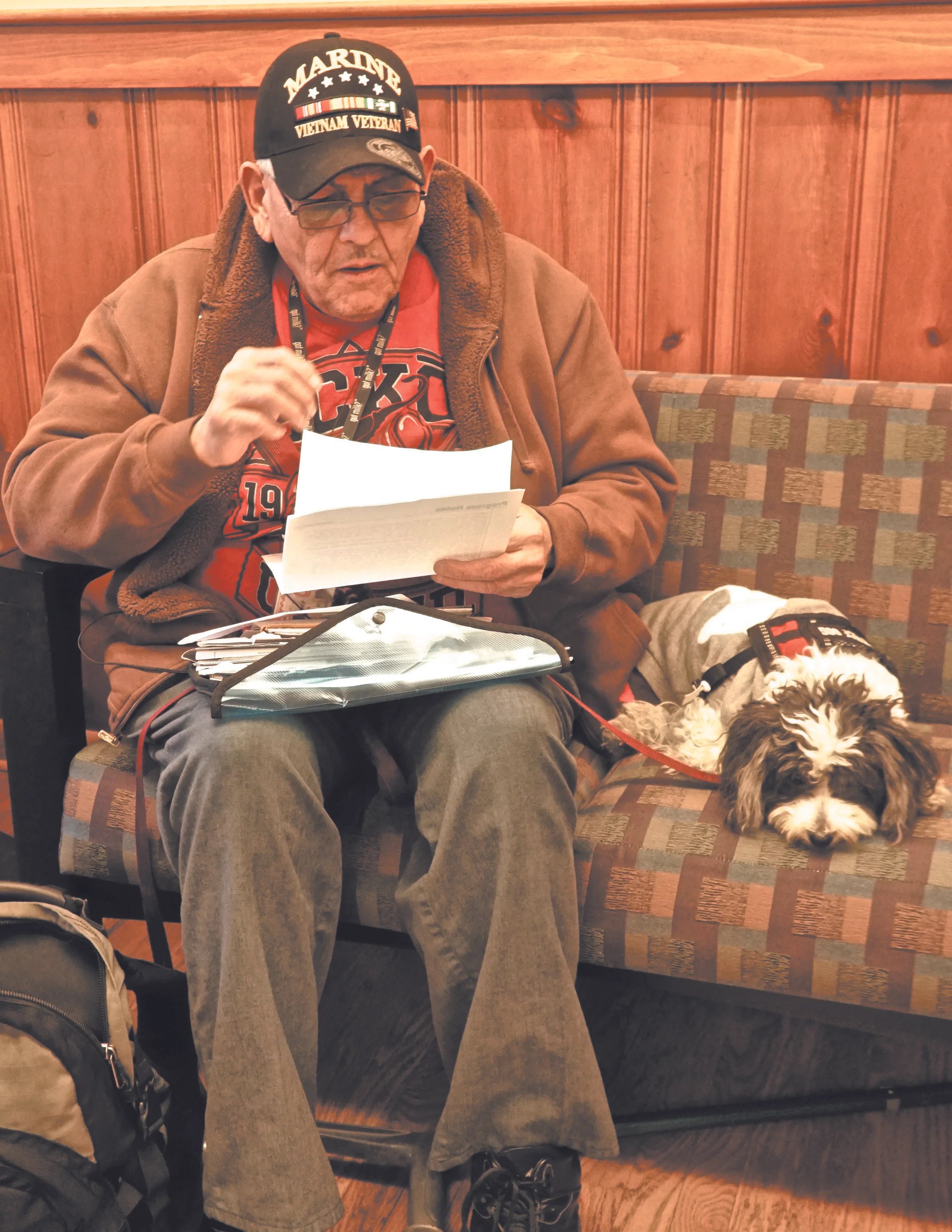Caring For Homeless Pets
by Erin Coleman
A client and his dog wait for an appointment during Peace, Love and Paws’ January clinic at St. Barnabas Episcopal Church. (Credit: Barbara Millman)
While it may seem strange to have over 30 dogs in the same room as stained glass windows and a pulpit, Dr. Carolyn Karrh, executive director and founder of Peace, Love and Paws, is thrilled to host the organization’s free monthly veterinary clinics at St. Barnabas Episcopal Church.
Peace, Love and Paws is a registered non-profit organization that helps care for pets of the homeless and indigent community in the Denver metro area. During clinics on the first Thursday of every month, Karrh — along with a team of other veterinarians, technicians, and administrative volunteers — provides vaccinations, vaccine certifications, wellness exams, pet supplies (including food, blankets and leashes), and occasionally euthanasia services, all free of charge.
“I tell our volunteers what we do here will remind you of why you became a vet in the first place,” said Karrh.
Peace, Love and Paws moved from its former location at Father Woody’s to St. Barnabas in November 2017.
“We left Father Woody’s when there were some organizational changes there last year and we found that St. Barnabas was a great fit for our needs and mission,” said Karrh. “St. Barnabas has been very welcoming and accommodating, and we love them! They have a lot of community outreach programs, so it worked very well for both of us.”
The organization sees between 30 and 50 patients at each clinic and has served over 1,000 since starting four years ago, according to Karrh.
“Pets are a catalyst for human connection,” said Barry Glass, a retired social worker who volunteers both counseling and administrative services for Peace, Love and Paws. “People tell me stories about how they met their animals and how their animals keep them going when they’re frustrated about their ability to continue.”
The January clinic had about 40 clients, meaning some waited over an hour. Client Percnell Sanford talked about how his restless dog, ‘Lil Girl, throws a ball to him — tossing her head to launch it in his direction — when she’s bored and wants to play.
“I try to keep her socialized, but I worry about all the diseases out there. I brought her here because of a rash on her stomach,” he said. “A neighbor told me about [Peace, Love and Paws]. This is the second time I’ve come [to a clinic]. It helps me out quite a bit. I can’t afford a vet.”
Because animals can be an impediment to acquiring housing, the organization started as a way to provide vaccines for pets. But it soon evolved.
“It used to just be vaccines,” said Karrh. “But today almost everyone brought their pet due to some sort of ‘problem.’”
“If this were a full-time job, I would do it,” said Chelsea Tincoff, who has been a veterinary technician for five years and has been volunteering with Peace, Love and Paws for about two and a half. “Unfortunately, we diagnose a lot of cancers. Ear, eye, upper respiratory infections. One of the most common things we see is dental disease.”
“We had a lot of diabetic cases today, as well as three euthanasias,” she added.
“Euthanasia is not the most pleasant thing, but to be in a warm setting with Dr. Karrh can be comforting,” said Glass.
Following her first career in music theater, Karrh’s passion for animals led to the University of Georgia Veterinary School and, later, a job at Harrison Memorial Animal Hospital (now PetAid) in Denver, where she served underprivileged families and their pets for over three years.
“Non-profit became where my heart was,” said Karrh. “When you make a difference in people’s lives, it also changes you. So, I decided to start a private practice and, eventually, Peace, Love and Paws.”
“The biggest assumption we deal with is that people who are homeless don’t deserve pets,” said Glass. “So, our role is also to provide community education. My favorite stories tend to involve people living in their cars. [Some of our clients] live in vans because they feel a shelter won’t accept animals.”
Peace, Love and Paws hopes to collaborate with other homeless service providers, including Denver’s Road Home, to address obstacles to allowing pets in shelters.
Interim Director and Program Administrator Chris Conner said Denver’s Road Home currently partners with Denver Animal Protection (DAP) to provide the Safe Haven Program, which offers two to four weeks of boarding for pet owners experiencing an episode of homelessness.
Glass acknowledges other obstacles Peace, Love and Paws’ clients face in regards to getting their companion animals, or emotional support animals, approved by prospective permanent housing facilities.
“Companion animals are allowed in what would otherwise be considered non-pet homes, but a lot of landlords don’t know that,” explained Alison Butler, director of legal services at Disability Law Colorado. The Fair Housing Act provides most of the legal support for Disability Law Colorado’s advocacy regarding companion animals.
In the future, Karrh hopes to open a facility in a larger, permanent location where Peace, Love and Paws can additionally offer hospitalization, surgeries, lab work, and potentially x-rays and microchipping.
“One of our regular clients was a lady who used to be a clinical therapist, but [at the time] was part of the witness protection program and living in her van. She had such an amazing outlook on life, and such gratitude [for the care we gave her dog],” said Karrh. “She told me, ‘you saved my life, because you saved hers!’” ■
To arrange pick-up for pet supply donations, or for more information about services, donors and clients can contact Peace, Love and Paws at 303-990-1893 or info@peacelovepaws.org.

